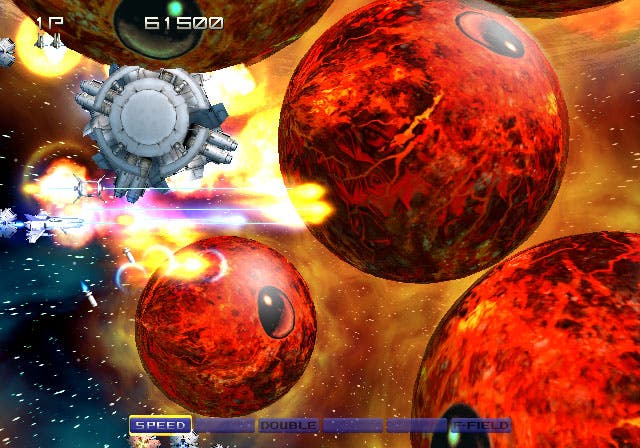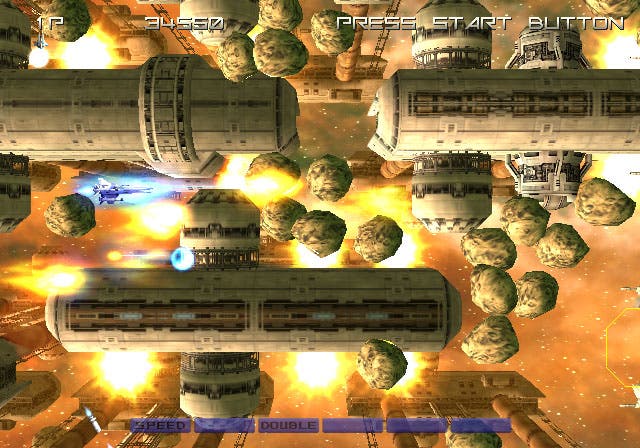Gradius V
Treasure's turn to revitalise the classic shooter series.
Somewhere in a darkened, dusty, slightly damp corner of Planet Earth there is a being capable of playing Gradius V the way it is meant to be played. No continues, no pussyfooting about on 'Very Easy' and certainly no more than three ships, thank you. If we ever meet that Gradius God, we'd like to shake his trembling, withered, twitch-gaming hands - that's if, indeed, this being has hands, and isn't simply using advanced gaming Telekinesis to communicate with the PS2 via neural impulses. To the game's developer, Treasure, we say: do you lay awake at night trying to think of the most evil ways to put paid to gamers? Why not simply allow the game to consist of a series of gaming deaths from different angles, quickly followed by a Game Over screen? Oh you did?
We're not sure which niche of the niche of the uber hardcore side-scrolling shooter niche Treasure designed Gradius V for, but it certainly should consider looking up the dictionary definition of 'Very' and 'Easy', and come back to us when it's considered that terminating the player approximately every 10 seconds might be construed as maybe as being a little over zealous in your desire to 'keep it real'. If there are any would be space pilots out there, ready to wage a surreal war against giant ships 100 times their size, maybe make sure you've said goodbye to your loved ones first, okay?
The more things change, the more things stay the same

So. Yes. Gradius V is challenging, in the sense that scaling Mount Everest naked with both (broken) legs tied together is challenging. It's one of those daringly 'old school' side-scrolling 2d shooters that follows in the long line of Konami's greats, stretching right back to 1985, believe it or not - and very little has changed in pure gameplay terms. Simple, pure, focused, memorise-'em-up blasting gameplay. Choose from five different power-up configurations and you're on your way. Galactic power opera to the nth degree; hear the cheesy pomp of the soundtrack. Feel the years fall away as you shoot the line of baddies at the top, get the power up, Speed Up, zoom down to the bottom, do the same, back to the top, Missiles, down the bottom, eek, big shower of enemies, duck, dodge, weave, Double Fire, crush the spinning boss (after 30 attempts of memorising his attack pattern and playing the videogame equivalent of Guide The Hook Around The Electrified Coat Hanger [it's 'Buzz Bar' -Ed]), and on we go.
Didn't we do this endlessly in the late '80s? Yes we did. That's the reason for this Thousand Yard Stare. Back then and it was fresh, fun, technically mind blowing and simply relentless; but back in those days we expected games to be this hard. They just were. It was the number one rule of arcade-style gaming - kill the gamer so they'll insert another coin and continue. A winning formula for the industry.
Shoe-horning that principle into a more casual couch-based gaming era in the mid-noughties is jarring to say the least. It may satisfy a loyal following of bloody-minded types that still insist on boring anyone in earshot to death that gaming was better in them days (it wasn't, okay, get a grip), but for the rest of us who have moved on, it feels like it's trying to prove how damned clever it is. "Look at me! Look how retro I am! I'm really hard! You gamers today don't know you're born! Come and have a go if you think you're hard enough!"
Just. One. More. Go...

But, no matter how frustratingly ridiculous the odds are against you, it's addictive as hell. No matter how much logic whispers in your ear that you'd have much more fun playing something else, there's a gamers' pride in there somewhere that forces you to have another go. 'Go on, you can do better'. And, of course, eventually you memorise the attack wave, grab the requisite power ups and through sheer iron will and no small amount of luck manage to squeeze through to the next section by the narrowest of margins. It might take hours to nail it properly, but one thing Gradius V has in spades is compelling gameplay. It just won't let go. Typically the more you play, the more credits the game dishes out, until eventually it simply gets the message and dishes out Free Play - and by god you need it. Once Treasure turns the heat up on you, there's no other way than to relentlessly battle on via the magic of continues. Seriously. We've played dozens of these games down the years and this is as hard as they come.
But what's the point of that? Did it really have to turn into a festival of Game Over screens to prove how hardcore it is? Or are we just really really rubbish at it? There is that possibility, but as a veteran of the Nemesis/Salamander/Delta/Project X-era, it's fair to say this writer knew what to expect. Nevertheless, self-deprecation is necessary to bypass those claiming in all seriousness that it's perfectly playable and trying to mock our lack of skills. It's compulsive gaming, make no mistake, but you have to question the logic of making a game that all but the absolute elite will get anything out of.
Technically, of course, it proves yet again that using 3D graphics on a 2D plane is a superb way to pull off extraordinarily gorgeous visuals. Apart from the very occasional frame rate stutter, it's a richly creative framework for Treasure to work within, and the talented team has gone all out to provide a stunning environment with an attention to detail rarely seen. The actual level layouts, however, are taxingly predictable, full of twisty turny tubes and corridors, that have - to be frank - been done to death. The weapons, as well, follow practically the exact same formula, and after all this time it'd be nice to insert some innovations. How about an alternate fire, for one thing, or a recharging Halo-style health system as opposed to one-touch-and-you're-dead? Anything new, at all, would have been appreciated, but there's literally nothing new here at all. It puts Ikaruga's fresh approach into sharp focus.
Grad school blues
Serving up a reheated portion of old school retro gaming might satisfy a few hardy souls, but it's hard to see its appeal extending much beyond that. If stupendously hardcore shooters that require the skills of other worldly beings are your thing, then the chances are you'll be in some sort of perverted masochistic heaven. The rest of us, though, should shout loudly at Konami for not making Gradius V accessible to the mainstream - even at the very easiest settings. Retro gaming in general deserves better than to have one of its finest exponents marginalised in this way, when what exists here is massive potential to reawaken a much missed genre. We can only hope there will be another opportunity to put things right.
Although we reviewed the Japanese version of Gradius V, in common with other Konami releases of late, it is almost entirely in English. A fully localised PAL version is due out in the autumn.

